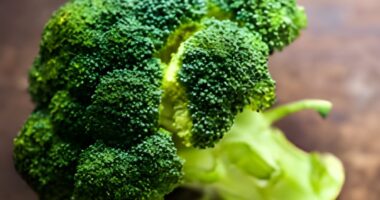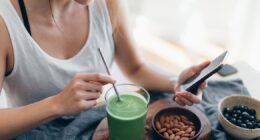Welcome to your 50s. If you haven’t already, it’s time to stop snacking like a teenager and start snacking on grown-up foods that you’ll quickly find are just as tasty and will make you feel (and maybe even look) a lot younger. That means finding substitutes for the unhealthy choices like cheese puffs, potato chips, and other highly processed foods that load you up with simple carbs, calories, and added sugars, and may negatively impact your health.
Think of snack time as an opportunity to do something positive for your body. “Snacks give us a chance to eat foods and nutrients that aren’t always included during mealtime, like nuts and fruit,” says Eatthis.com medical review board member Lauren Manaker, MS, RDN, a registered dietitian nutritionist. “Snacks can help prevent nutritional gaps as long as you include nutrient-dense foods on your snack plate.”
Numerous studies suggest that eating healthy snacks can be an effective way to control your appetite and cravings, which could result in avoiding weight gain. But when you consider that the USDA estimates nearly one-third of a person’s daily calories come from snacks, it’s clear how important your choice of snack becomes.
Developing healthful snacking habits like these will help you live a healthier life well beyond your 50s.
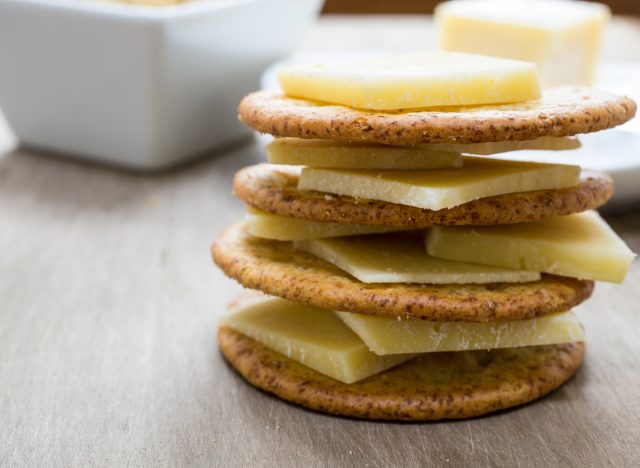

Even nutritious snacks can pack on pounds if you eat too many, so get into the habit of practicing portion control by knowing the calories in the foods you choose. That way you won’t unwittingly overeat or ruin your appetite for dinner. A good rule of thumb for a reasonable snack size is 150 to 250 calories, according to The Nutrition Source at Harvard T.H. Chan School of Public Health. For perspective, that’s about the amount you’ll get in string cheese with 6 whole grain crackers.
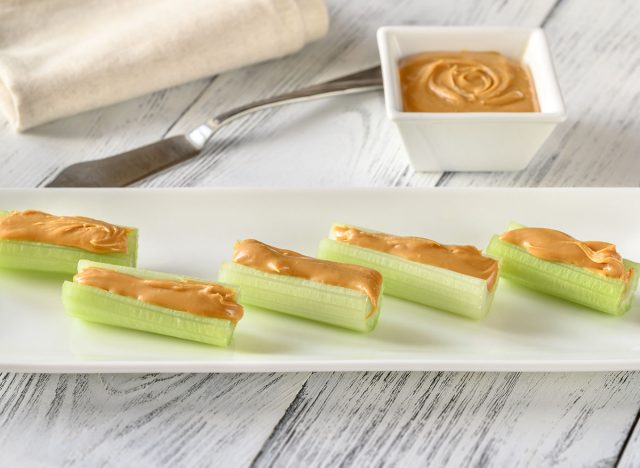

It’s a good practice to have some protein with every meal, and that includes snacks because protein is hunger-satisfying, keeping you feeling full between meals. That means you’ll be less likely to crave sugary carbohydrates and overeat because you’re ravenous.
And there are more benefits to this satiating macronutrient after 50: “High-quality protein is essential for maintaining muscle mass as we age and thus helping keep us strong and agile,” says Eatthis.com medical review board member Amy Goodson, MS, RD, a registered dietitian and author of The Sports Nutrition Playbook.
Try to get 25 to 30 grams of protein in your snacks, which is the amount you should shoot for at breakfast, lunch, and dinner. Goodson says some examples of the best snacks for the over-busy, over-50-year-old are Greek yogurt parfaits, natural peanut butter and celery sticks, hard-boiled eggs, tuna, cheese, milk, turkey roll-ups, seeds, and trail mix.
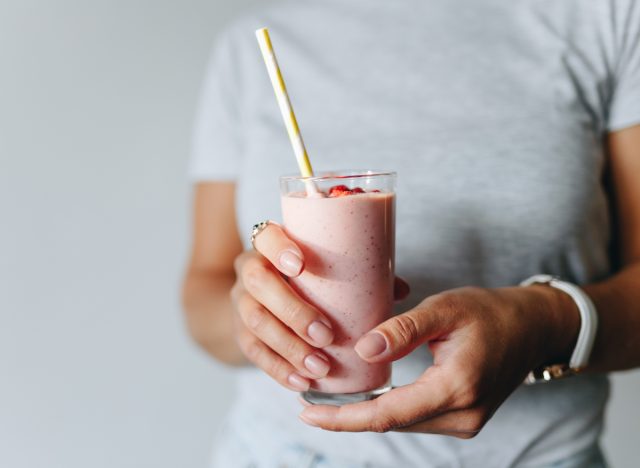

Smoothies made with whey or a plant-based protein powder are terrific as meal replacements or snacks. Just be sure to practice portion control. Adding fruit, nut butters, and other ingredients to your smoothie can turn it into a calorie bomb. Even though it’s a drink snack, keep the calories to the recommended 150- to 250-calorie portion size.
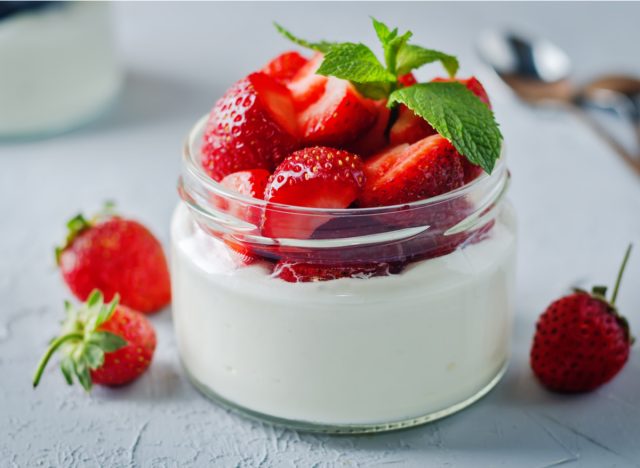

If you’re in your 50s, you’re probably concerned about reducing your risk of chronic diseases like cardiovascular disease, type 2 diabetes, and high blood pressure. In that case, you’ll want to include milk and dairy foods in your mix of healthy snacks; their unique nutrient makeup has been linked to reduced risk of these chronic diseases, says medical board advisor Toby Amidor, MS, RD, a registered dietitian and best-selling author of Diabetes Create Your Plate Meal Prep Cookbook.
“Milk is the leading food source of calcium, vitamin D, and potassium, three nutrients of public health concern that were identified by the 2020-2025 Dietary Guidelines for Americans,” Amidor says. “These nutrients are lacking in diets at every life stage, including both men and women in their 50s.”
READ RELATED: 10 Ways to Make Cooking Less Miserable When It’s Sweltering Outside
Three servings from this food group are recommended per day. Incorporating them into snacks can help you easily achieve that goal. Amidor recommends trying these snack ideas: Peanut Butter Cherry Smoothies made with milk, Strawberry-Kiwi Yogurt Parfaits made with Greek yogurt, or a snack pack of Honey Ricotta with Strawberries.
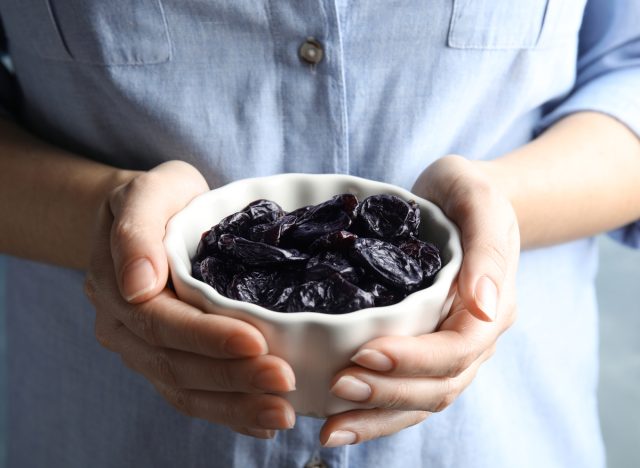

Prunes. Before you roll your eyes and tell us you’re not constipated, get this: prunes are very good for your bones, something that the 50-something snacker should recognize. “Bone health becomes incredibly important to focus on as you age, regardless of your gender, because with age, we can experience bone loss, which can increase our risk of fractures,” explains Manaker, author of The First-Time Mom’s Pregnancy Cookbook. “Prunes are a natural source of boron, magnesium, and other bone health-supporting nutrients.”
These fruits have been studied for their impact on bone strength. In one report published in the British Journal of Nutrition, postmenopausal women who ate 4 to 5 prunes (50 grams) every day showed a significantly increased bone mineral density in comparison to women who did not eat the prunes. And prunes are good for guys, too. Data published in Nutrients suggests that men who eat prunes improve their bone turnover, the ability for bone to be reabsorbed and rebuilt.
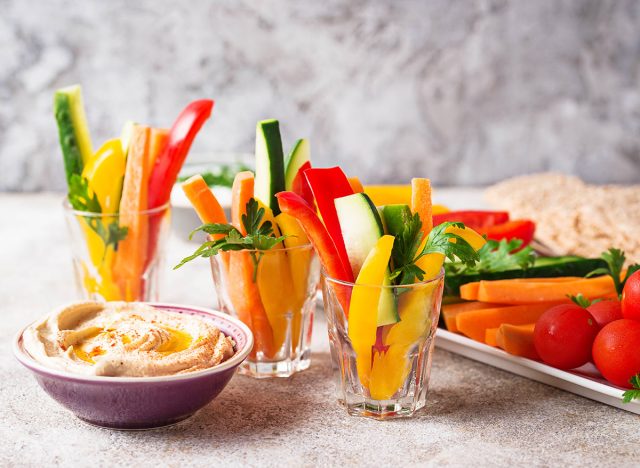

That means using vegetables as go-to snacks. “In your 50s, your metabolism decreases so you can no longer eat the same number of calories without gaining weight,” says eatthis.com medical board member Julie Upton, MS, RD, a registered dietitian and co-founder of Appetite for Health. “Upping the veggies in your main meals and snacks will help you naturally reduce your daily calories.”
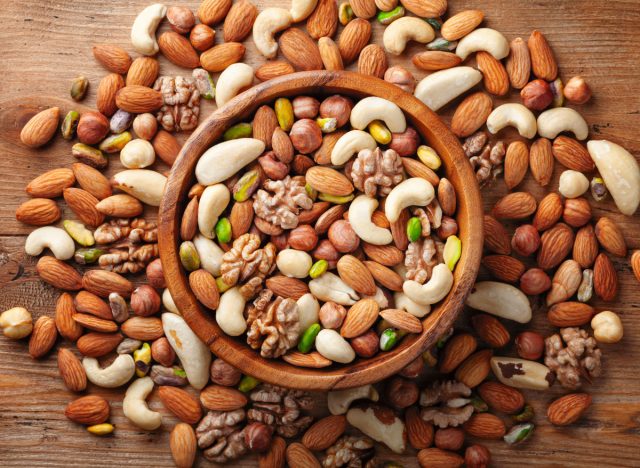

Nuts are great snack foods for those over 50. They contain protein, fiber, and healthy fats, all of which crush hunger pangs. Walnuts, pistachios, almonds, cashews, and pecans all contain the plant-derived omega-3 fat called ALA (or alpha linolenic acid) which is an anti-inflammatory fatty acid linked to heart and brain health.
The American Heart Association recommends snacking on one ounce of nuts daily in place of a serving of red meat for heart health benefits and preventing weight gain.


A healthy snack shouldn’t just hold you over until dinnertime. Make it work harder for you. Choose a snack that supports, for example, brain health. “Cognitive function becomes a priority as we age and focusing on meeting our body’s choline needs can help accomplish this goal,” says Manaker. Your brain needs the essential nutrient for memory, mood, and muscle control and to develop red blood cells.
A recent observational study in The American Journal of Clinical Nutrition demonstrated that risk of developing dementia was 28% lower in men with the highest consumption of choline when compared with men who had the lowest intake of the nutrient. “Egg yolks are one of the best sources of choline, so including eggs in your diet can be a smart dietary habit to get into in your 50s,” Manaker says.
Pack a hard-boiled egg as a snack if you can’t fit eggs into your morning rush. Don’t fear dietary cholesterol. The American Heart Association says one egg a day can be part of a healthy diet.
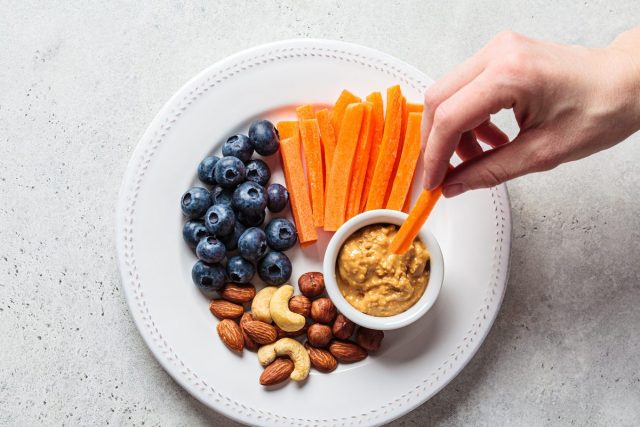

Skipping meals is a bad habit because it often leads to being ravenous and overeating when you do eat. “Get in the habit of eat at regular intervals,” advises eatthis.com medical review board member Amy Shapiro, MS, RD, a registered dietitian and founder of Real Nutrition.
Smart snacking is the best way to ensure you keep hunger at bay. “Just avoid processed snacks, simple sugars, white carbs, and excessive amounts of fruit; I limit my clients to 2 to 3 servings per day. And, of course, avoid drinking sugary beverages and juices with snacks.”
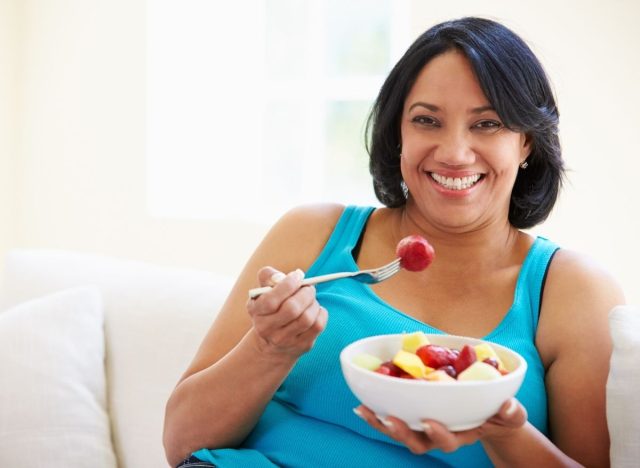

Want to watch a big bag of chips disappear like magic? Watch a movie with the open bag in your lap. Distraction is the arch nemesis of portion control. Studies show that when attention is distracted people tend to consume more calories without realizing it.
So, perhaps the most effective snacking habit to establish after you turn 50, if not before, is mindful snacking. Slow down, focus on the food, savor the flavors, and be aware of what you’re eating and how much because it’s supposed to be a snack.
Source:





